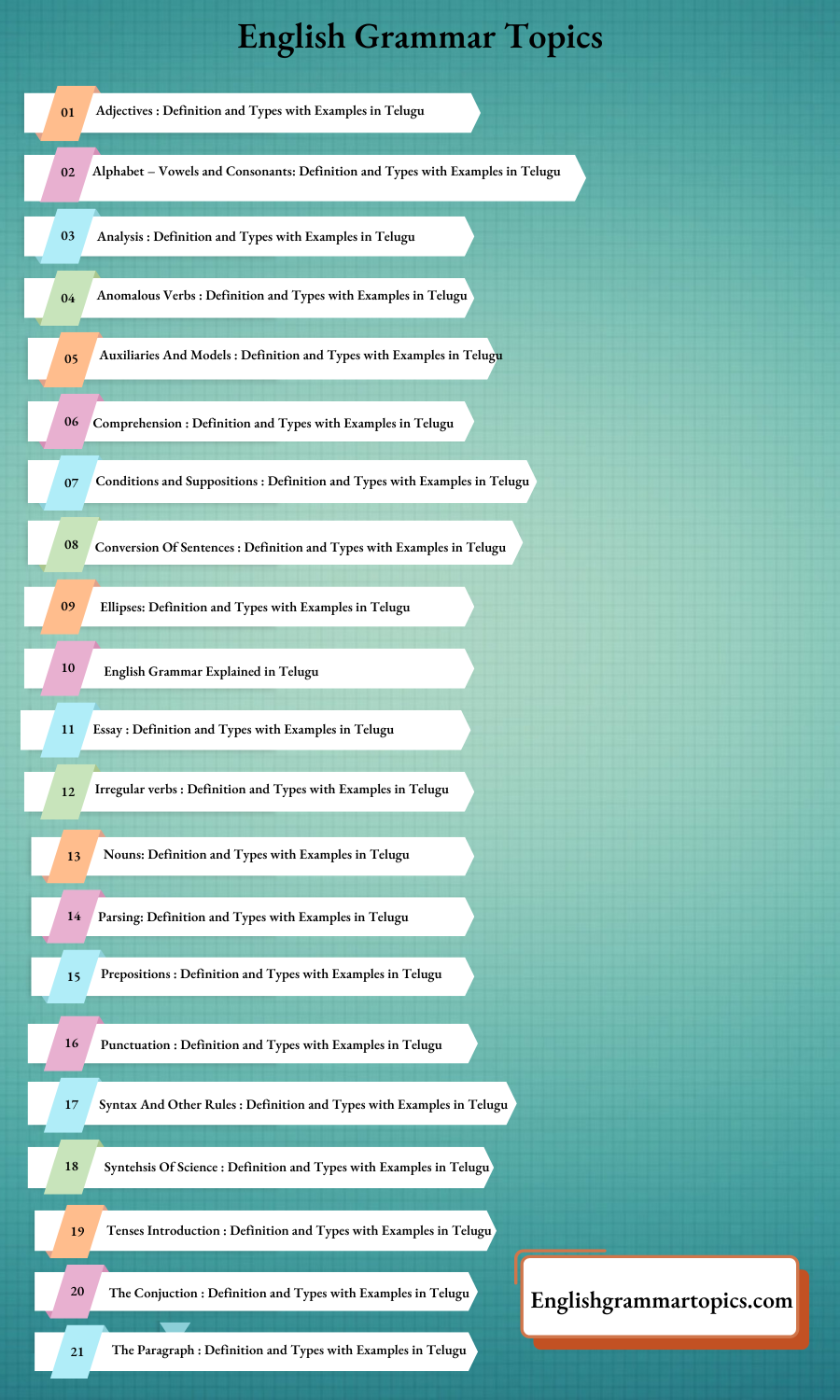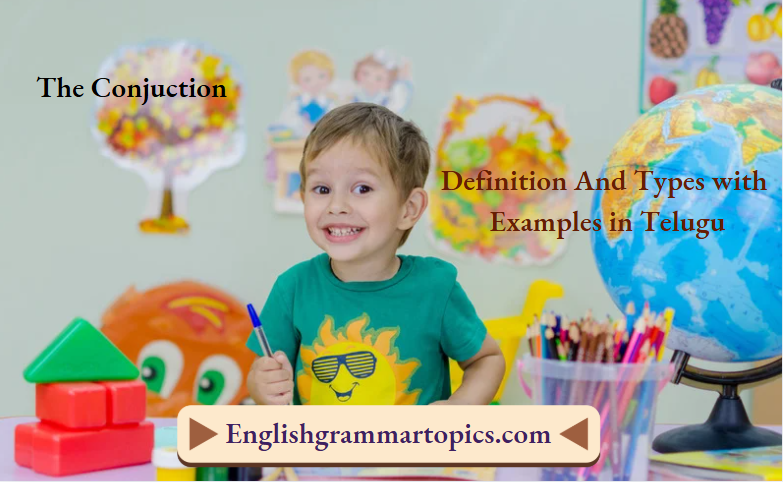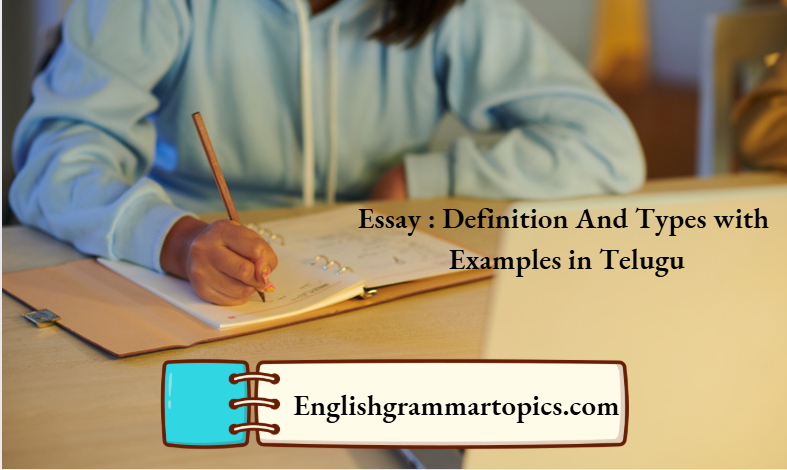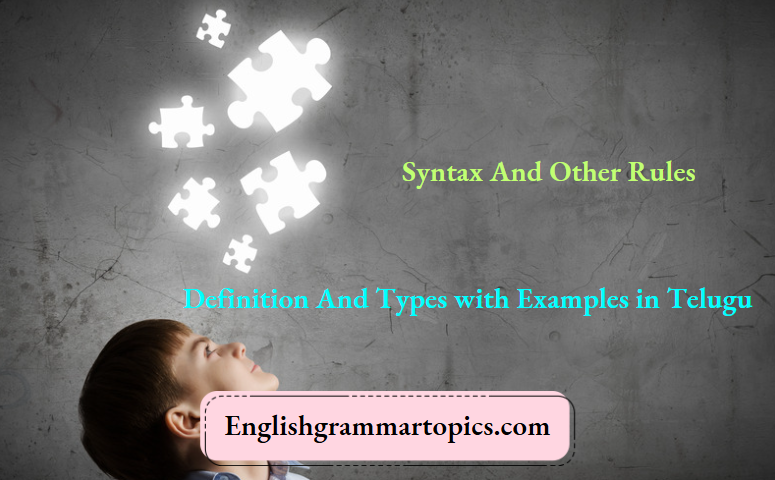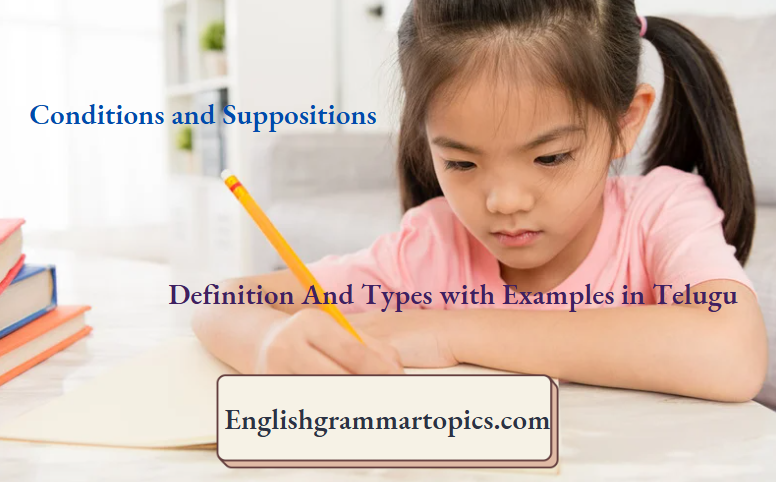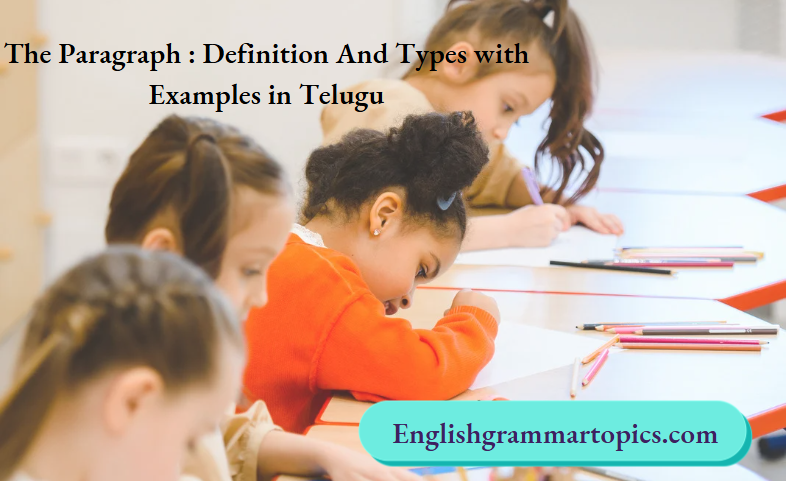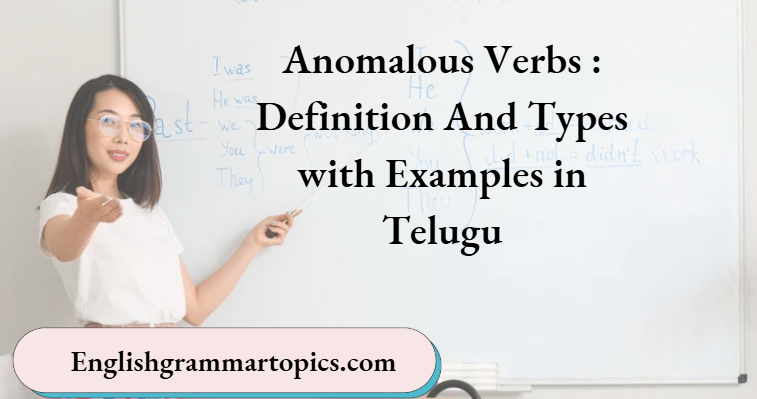Auxiliaries And Models
288. Be అను ధాతువు నుండి పుట్టిన am, is, was, do మొదలగు పదములను మామూలు verbs తో కలిపి tenses, passive forms, questions మరియు negatives భావములను సృష్టించునపుడు వానిని auxiliary verbs (సహాయక క్రియలు) అంటారు.
289. can, could, may, might, will, would, shall, should, must and ought verbs modal verb modals అని పిలుస్తారు. వీనిని ordinary verbs ముందు వాడతారు. అప్పుడు అవి permission, possibility, certainty (తప్పని సరి పరిస్థితి) మరియు necessity (అవసరము) అను భావములను తెలియజేయును. Need మరియు dare అను పదములను కూడా modal verbs గా
వాడవచ్చును.
Modals ను చాలా సందర్భాలలో auxiliaries అనగా సహాయక క్రియల జాబితాలో చేర్చుతారు. కొన్ని grammer పుస్తకాలలో వానిని “Modal Auxiliaries” అని అంటారు.
Read and Learn more English Grammar Topics
290. Modals o can, could, may, might, shall, should, will, would, must 50 ought పదములు Defective Verbs అనబడును. ఎందుకనగా వానిలో భావసంబంధమైన కొన్ని parts లోపించి యుండుట వలన. They have no – s in the third person singular, వానికి infinitve లేదు. -ing form .

BE
291. Auxiliary verb (సహాయక క్రియ or helping verb) అయిన be ని ఈ క్రింది విధముగా వాడవచ్చును.
(1) continuous tenses (action 3 on 3)
ఈ క్రింద చూపబడిన విధముగా form చేయునప్పుడు
He is working. I was writing.
(2) Passive voice verb form :
The gate was opened.
Be ని infinitive తో కలిపినపుడు
1)plan, arrangement és agreement o
I am to see him tomorrow.
We are to be married next month.
2) ఒక ఆజ్ఞను యిచ్చునపుడు
You are to write your name at the top of each sheet of paper.
Mother says you are to go to market at once.
291. కార్యాచరణలో పెట్టని ఒక arrangement లేక plan నూ సూచించడానికి “Be” ను past tense లో perfect infinitive తో వాడతారు.
They were to have been married last month but had to postpone the marriage until June.
Have
293. Perfect tense ను form చెయ్యడానికి auxiliary have ను వాడతారు.
He has worked. He has been working.
294. Obligation అనగా ఒక బాధ్యతకు కట్టుబడిన సందర్భములో infinitive తో కలిపి “Have to” ను వాడతాము.
I have to be there by five o’clock.
He has to move the furniture himself.
295. ఒక వ్యక్తి యొక్క బాద్యతను past tense భావములో తెలియజేయుటకు “had to” ను వాడతాము.
I had to be there by five o’clock.
He had to move the furniture himself.
296. వ్యతిరేక పరిస్థితిలోను (negatives), ప్రశ్నలు అడుగు సందర్భములోను “have to” మరియు
“had to” అను పదములను do, does, did అను పదములతో కలిపి వాడతాము. ఈ విధంగా :-
They have to go.
He has to go.
He had to go.
They don’t have to go. Do they have to go? He doesn’t have to go. Does he have to go? He didn’t have to go. Did he have to go?
DO
297. Auxiliary verb (helping verb) అయిన do అను పదమును ఈ విధముగా వాడతాము. (1) మామూలు verbs తో form అయిన simple present tense మరియు simple past tense లలోని negative అర్ధాలకు మరియు interrogative అర్థాలకు (వ్యతిరేక మరియు ప్రశ్నార్ధక అర్ధాలు) do ని వాడతాము.
He doesn’t work. He didn’t work. Does he work?
Did he work ?.
(2) అంతకు ముందు ప్రయోగించిన ordinary verb ను మరల చెప్పవలసిన అవసరం లేనప్పుడు
Do you know him ? Yes, I do..
She sings well. Yes, she does.
You met him, didn’t you? He eats fish and so do you.
298. ఒక స్టేట్మెంటు విషయంలో “అవును” అని అంగీకరించలసినపుడు, అట్టి భావమును వెలిబుచ్చుటకు, Do ను వాడతాము.
You do look pale.
I told him not to go, but he did go.
299. గత్యంతర పరిస్థితిలో imperative అను పదమును కలిపితే, ఆ గత్యంతర పరిస్థితిని ఒక విన్నపము ద్వారా, ఒక ఆహ్వానము ద్వారా మరియు మెల్లగా ఒప్పించుతూ తెలియజేసినట్లువుతుంది.
Do be quiet,
Oh, do come ! It’s going to be such fun.
In such cases do is strongly stressed.
Can, Could, May, Might
300. Can సహజముగా, శక్తి సామార్థ్యాన్ని అనగా capacity ని తెలియజేస్తుంది. దానిని సాధారణంగా అనుమతి యిచ్చుటకు ఉపయోగించరాదు. అనుమతి ఇవ్వడానికి may గాని might గాని వాడాలి.
I can swim across the river.
He can work this sum.
Can you lift this box?
301. కొన్ని ప్రత్యేక సందర్భాలలో Can మరియు may అను auxiliary verbs (helping verbs) ను permission (అనుమతిని) తెలియజేయడానికి వాడతాము. May అను auxiliary verb ని వాడితే, అధికార పూర్వకముగా ఆ అనుమతిని యిచ్చినట్లు అర్ధం వస్తుంది. Can కంటే may కు అధికార హోదా ఎక్కువ.
May is rather formal. You can/may go now.
Can/May I borrow your umbrella?
302. Affirmative sentences లో (అవును అని చెప్పునవి) అవకాశం ఉన్నది అని చెప్పు సందర్భములో May అను పదము అధికారరీత్యా ఆ భావమును వెలిబుచ్చును. Can ను interrogative మరియు negative sentences లో వాడతాము.
It may rain tomorrow.
He may be at home.
Can this be true ?
It cannot be true.
‘It cannotbe true’ ను
‘It may not be true’ తో పోల్చి చూడండి. Cannot అసాధ్యాన్ని తెలియజేస్తుంది. may not అను పదము అది జరిగి (సంభవించి) ఉండకపోవచ్చు అనే అర్ధాన్ని ఇస్తుంది.
303. సాంప్రదాయబద్ధమైన English లో may అను పదము ఒక అభిలాషను తెలియజేస్తుంది. ఈ విధంగా
May you live happily and long!
May success attend you !
304. Could and might అను పదములను వాని present tense భావములో can and may గా వాడతారు.
I could swim across the river when I was young. (Ability)
He said I might / could go. (Permission)
I thought he might be at home. (Possibility)
She wondered whether it could be true. (Possibility)
305. పైన ఉదహరించిన మొదటి వాక్యములో Could అను పదము నేర్పరితనమును (ability) తెలియజేస్తుంది కాని ఆ పనిని ఎలా చేసిందీ చెప్పదు.
ability ని action తో కలిపి చెప్పాలంటే, అనగా ఎంత బాగా ఇది అప్పుడు జరిగింది అని చెప్పాలంటే was able to swim) or were able to swim) అని చెప్పాలి.
When the boat was upset, we were able to (or managed to) swim to the bank, (not: we could swim to the bank)
Negative statements లో, అనగా ప్రారంభములోనే నాస్తిక శబ్ధము చూపిన లేక ప్రమాదమును సూచించిన వాక్యములలో could ను గాని, was able to ని గాని were able to ని గాని వాడవలయును.
306. వర్తమాన కాలగమనమును చూపించు వాక్యములలో (present-time contexts) could, man and may ల భావాలను తగ్గించినట్లవుతుంది.
I could attend the party. (Less positive and more hesitant than ‘I can attend the party’.)
Might/ Could I borrow your bicycle? (A diffident way of saying ‘May / Can I……)
It might rain tomorrow. (Less positive than ‘it may rain …..)
Could you pass me the salt ? (Polite request)
307. పరిమితమైన అసంతుప్తిని కాని, కొంత మందలింపు భావాన్ని కాని తెలియజేయుటకు Might ను వాడతారు.
You might pay a little more attention to your appearance.
308. Perfect Tense infinitive కు can could, may మరియు might లను వాడటం గమనించండి. He is not there. Where can he have gone? (= Where is it possible that he has gone? – May expresses annoyance.)
You could have accepted the offer. (= Why didn’t “you accept the offer?)
Fatima may /might have gone with Saroja. (= Possibly Fatima has gone/ went with Saroja.)
Why did you drive so carelessly? You might have run into the lamp-post. (= It is fortunate that yoy didn’t run into the lamp-post.)
Shall, Should, Will, Would
309. Simple future tense భావాన్ని ఇవ్వడానికి First person pronoun (నేను, మేము మొదలగునవి) లో “shall” ను మరియు First, second and third persons లో “will” ను వాడతాము కాని ఈ రోజులలో | shall, We shall కన్నా | will మరియు we will పదములనే ఎక్కువగా వాడుచున్నారు.
I shall / will be twenty-five next birthday.
We will need the money on 15th.
When shall we see you again? Tomorrow will be Sunday.
You will see that I am right.
Modern English లో అన్నీ persons (l, we, and you, He, she, it, they etc.) కు will వాడకం పెరిగింది.
310. ఒక ఆదేశమును (command) ఒక వాగ్దానమును లేక ఒక బెదిరింపును సూచించడానికి second మరియు third persons లో (నీవు, వాడు etc.) “shall” ను కొన్ని సార్లు వాడతారు.
He shall not enter my house again.
You shall have a holiday tomorrow.
You shall be punished for this.
(Command) (Promise)
(Threat)
Modern English లో shall ను ఈ విధంగా వాడడం చాలా వరకు తగ్గిపోయింది అని గమనించండి.
311. ఎవరికైతే ప్రశ్నలు వేస్తామో, వారి మనోభావమును తెలుసుకోవడానికి shall I shall we అనే పదాలను ప్రశ్నలో జోడిస్తాయి.
Shall I open the door ? (i.e.. Do you want me to open it ?)
Which pen shall I buy ? (i.e.. What is your advice ?)
Where shall we go ? (What is your suggestion ?)
312. Will అను సహాయక క్రియా పదమును ఈ క్రింది విధంగా ఉపయోగిస్తారు.
1) Volition కొరకు (ఇచ్ఛ కొరకు)
I will (wam willing to) carry your books.
I will (promise to) try to do better next time.
I will (-am determined to) succeed or die in the attempt.
పై మూడవ example లో Will ఆ వ్యక్తి యొక్క ఇచ్ఛలోనున్న బలాన్ని చూపుతుంది.
2) వ్యక్తికి సహజంగా నున్న అలవాటును చూపుటకు.
He will talk about nothing but films.
She will sit for hours listening to the wireless.
3) నొక్కి వక్కాణించి చెప్పు సందర్భములో.
This will be the book you want, I suppose.
That will be the poptman, I think.
313. ఒక ఆహ్వానమును అందించునపుడు మరియు ఒక విన్నపనును చేయునపుడున్నూ Will ను
వాడతాము.
Will you have tea?
Will you lend me your scooter?
314. Shall మరియు Will అను పదములకు Should మరియు would పదములను భూతకాల
past tense) సందర్భములలో వాడెదరు.
I expected that I should (more often: would) get a first class.
He said he would be twenty-five next birthday.
She said she would carry my books.
She would sit for hours listening to the wireless. (Past habit)
315. ఒక వ్యక్తి చేయవలసిన duty ని గాని, అతని బాధ్యతను గురించి గాని చెప్పవలసి వచ్చినపుడు “Should” అను auxiliary verb అన్ని persons (first, second, third persons) కు వర్తిస్తుంది.
We should obey the laws.
You should keep your promise.
Children should obey their parents.
316. ఒక అవస్థను condition గురించి గాని, ఒప్పందములో ఒక rule ను గురించి గాని తెలియజేయు clause లో “should” సహాయక క్రియను ఒక ఊహాజనితమైన అభిప్రాయము తెలియజేయుటకు వాడతారు. ఆ ఊహ యదార్ధమైనది కాకపోవచ్చు. ఫరవా లేదు.
If it should rain, they will not come.
If he should see me here, he will be annoyed.
317. ఈ క్రింది వాక్యములలో మాదిరిగా Should మరియు would పదములను వాడవచ్చును.
(1) | should (or: would) like you to help her. (‘Should/would like” is a polite form of ‘want’).
(2) Would you lend me your scooter, please ? (‘Would you ?’ is more polite than ‘Will you ?’)
(3) You should have been more careful. (Should + perfect infinitive indicates a past obligation that was not fulfilled).
(4) He should be in the library now. (Expresses probability)
(5) I wish you would not chatter so much. (Would after wish expresses a strong desire).
Must, Ought To
318. Mustను అవసరాన్ని తెలియజేయుటకు మరియు బాధ్యత గురించి చెప్పుటకు ఉపయోగింతురు. You must improve your spelling.
We must get up early.
318 A . ప్రస్తుత కాలానికి (Present tense) మరియు సమీప భవిష్యత్తును గురించి (near future) చెప్పుటకు “Must” ను ఉపయోగిస్తాము. భూత కాలము లేక past tense ను గురించి చెప్పడానికి “had to” అను సంయుక్త పదమును వాడతాము. Must అను పదమునకు past tense లేదు. “Have to” అను present tense సంయుక్త పదమునకు “had to” అనునది past tense.
Yesterday we had to get up early.
319. Speaker కు బాధ్యత ఉన్నపుడు “Must” ను వాడతాము. భాధ్యత (obligation) యింకొకరికి ఉన్నపుడు “have to” అను జంట పదమును వాడతాము.I must be on a diet. (It is my own idea.)
I have to be on a diet. (The doctor has told me to be on a diet.)
319 A. తర్కశాస్త్ర సంబంధమైన (logical) భావముతో ఒక విషయమును చర్చించునపుడు కూడా Must అను పదమును వాడతాము.
Living in such crowded conditions must be difficult. (I am sure it is difficult.)
She must have left already. (I am sure she has left already).
320. Ought (to) అను సహాయక క్రియ (Auxiliary verb) ఒక నైతిక బాధ్యతనుగాని, ఒక
అభిలషణీయమైన విషయమునుగాని (desirability) తెలియజేయును.
We ought to love our neighbours.
We ought to help him. You ought to know better.
321. Ought (to) అను పదము “బహుశా ఇది సంభవమే” అనే అభిప్రాయాన్ని కూడా తెలియజేస్తుంది.
Prices ought to come down soon.
This book ought to be very useful.
Used (To), Need, Dare
32. Used (to) అను auxiliary పదము కొంత కాలం క్రితం విరమించుకున్న అవాటును గురించి
There used to be a house there.
I used to live there when I was a boy.
వాడుక English లో “Did you use to” మరియు “did not use to” అనే పదాలను వాడుచున్నారు. “Used to” మరియు “Used not to” అను పదాలు మరుగున పడిపోయినవి.
323. Need అను పదము అవసరాన్నిగాని, బాధ్యతనుగాని తెలియజేస్తుంది. దానిని do తో కలిపిగాని కలపకుండాగాని వాడవచ్చును. “Do” లేకుండా వాడినపుడు దానికి – S మరియు ed forms ఉండవు. దానిని – to లేకుండా ఒక infinitive తో కలిపి negative మరియు interrogative sentences లో వాడతారు. Scarcely మరియు hardly అను పదములతో వాడినపుడు అది semi-negative భావాన్ని యిస్తుంది (సగం negative భావము)
He need not go. (=It is not necessary for him to go.)
Need I write to him?
I need hardly take his help.
324. Need అను పదమును “do” తో కలిపినప్పుడు అది – needs మరియు -needed సరళిలో ఉండును. అది ఇచ్చట “to” తో వాడబడుతుంది. ఇది negative భావములలోను, ప్రశ్నించు భావములలోను వాడబడుతుంది. అర్ధ negative (semi-negative) వాక్యములలో కూడా వాడబడుతుంది. Scarcely మరియు hardly అనునవి semi-negative పదములు. ఈ రెండు పదములకు “కాదు” అనే భావం పూర్తిగా రాదు.
Do you need to go now?
I don’t need to meet him.
One needs to be careful.
325. ఈ క్రింది వానిని పోల్చి చూడండి :
1) I didn’t need to buy it. (అది నేను కొనియుండవలసిన అవసరము లేదు అందువలన నేను లేదు.
2) I needn’t have bought it. (అది నేను కొనవలసిన అవసరం లేదు కాని నేను కొన్నాను).
(1) I didn’t need to buy it. (=It was not necessary for me to buy it and I didn’t buy it.)
(2) I needn’t have bought it. (=It was not necessary for me to buy it, but I bought it.)
326. Auxiliary verb అయిన dare కు తగిన ధైర్యము కలిగి యుండుట) మామూలు verb అయిన dare (ధైర్యము) నకు అర్ధంలో తేడా ఉంది. ఈ పదము third person singular present tense form లో కూడ – Sతో రాదు. ఈ ప్రయోగము negative sentences లో మరియు interrogative sentences లో జరుగుతుంది. ఈ పదమును “do” అను పదముతో కలపకుండా వాడినపుడు infinitive ను పక్కన వాడతాము. కాని “to” ఉండదు. కాని “do” ని కలిపినపుడు infinitve ను “to” ను ఉంచిగాని ఉంచకుండా గాని వాడతాము.
He dare not take such a step.
How dare you contradict me ? He dared not do it.
He doesn’t dare speak to me.
సరియైన పదమును ఎంచుకొనుము.
అధ్యాయము 331
Conjugation Of The Verb Love
327. ఒక verb ను యింకొక word తో కలిపినపుడు, అది తద్వారా సంతరించుకున్న వివిధ రూపములను చూపుతుంది. ఈ మార్పు రూపభేదముల రూపంలో గాని (inflection), లేక ఇతర parts of other verb లతో కలిగిన కలియిక వలనగాని సంభవించును. ఈ పరిణామము Voice, Mood, Tense, Number and Person ల రూపములలో కనిపించును. అప్పుడు వానికి తగిన Infinitives మరియు Participles ను కలుపవలయును. ఈ క్రింది examples లో love అను verb యొక్క క్రియారూపక నిష్పత్తి (conjugation) = Verb చూపించు యివ్వబడినది. ఇది student కు చాలా సహాయకారిగా నుండును. Conjugation భావములో రూపభేదము.
(1) Tenses
Simple Present
Active
I love I am loved
You love You are loved
He loves He is loved
They love They are loved
Present Continuous
Active Passive
I am loving I am being loved
You are loving You are being loved
He is loving He is being loved
We are loving We are being loved
They are loving They are being loved
Present Perfect
Active Passive
I have been loved I have loved
You have loved You have been loved
He has loved He has been loved We have loved We have been loved
They have loved They have been loved
Present Perfect Continuous
Active Passive
I have been loving ………………
You have been loving ………………
He had been loving ……………….
We have been loving ……………….
They have been loving ……………….
Simple Past
Active Passive
I loved I was loved
You loved I was loved
He loved He was loved
We loved We were loved
They loved They were loved
Past Continuous
Active Passive
I was loving I was being loved
You were loving You were being loved
He was loving He was being loved
They were loving They were being loved
Past Perfect
Active Passive
I had loved I had been loved
You had loved you had been loved
He had He had been loved
We had We had been loved
They had They had been loved
Past Perfect Continuous
Active Passive
I had been loving ……………….
You had been loving ……………….
He had been loving ……………….
We had been loving ……………….
They had been loving ……………….
Simple Future
Active Passive
I shall / will love I shall / will be loved
You will love You will be loved
He will love He will be loved
We shall love We shall be loved
They will love They will be loved
Future Continuous
Active Passive
I shall / will be loving ……………….
I will be loving ……………….
You will be loving ……………….
He will be loving ……………….
We shall be loving ……………….
Future Perfect
Active Passive
I shall / will have loved I shall / will have been loved
You will have loved You will have been loved
He will have loved He will have been loved
We shall have loved We shall have been loved.
They will have loved They will have been loved
Future Perfect Continuous
Active Passive
I shall / will have been loving ……………….
You will have been loving ……………….
He will have been loving ……………….
We shall have been loving ……………….
They will have been loving ……………….
(2) The Imperative
Active Passive
Love Be loved
(3) Non-Finites
Active Passive
Present Infinitive to love to be loved
Continuous Infinitive to be loving ………
Perfect Participle to have loved to have been loved
Present Participle loving being loved
Perfect Participle having loved having been loved
The Adverb
328.
1. Rama runs quickly.
2. This is a very sweet mango.
3. Govind reads quite clearly.
(1) మొదటి వాక్యములో quickly అను పదము ఎలా (how) పరుగెత్తిందీ చెబుతూంది. అనగా quickly అను పదము Verb అయిన run అను పదమును సవివరంగా వివరిస్తుంది.
(2) రెండవ వాక్యములో very అను పదము how much (ఎంత) అనే అర్ధాన్ని వివరిస్తుంది. అనగా very అను adverb “runs” అనే verb ని విపులీకరిస్తుంది. ఇది sweet అనే Adjective ను ఇక్కడ అజమాయిషీ (modify) చేస్తుంది.
(3) మూడవ వాక్యములో quite అను Adverb ఎంత దూరము లేక ఎంత వరకు అను భావాన్ని వివరిస్తుంది. Quite అను Adverb యిచ్చట clearly అనే యింకొక Adverb ను వివరిస్తుంది.
ఒక పదము verb నకు, adjective నకు మరియు ఇంకొక adverb నకు additional గా వివరణ ఇచ్చినపుడు, అట్టి పదమును adverb అంటాము.
Def. (నిర్వచనము) :- Verb యొక్క గాని, Adjective యొక్క గాని ఇంకొక Adverb యొక్క గాని అర్ధమునకు అదనముగా వివరణ ఇచ్చినపుడు, అట్టి పదమును Adverb అంటాము. (Add + verb = Adverb)
329. ఇచ్చట Adverb కొన్ని సంయుక్త పదములను (phrases) వ్యాఖ్యానిస్తుంది.
She was sitting close beside him.
At what hour is the sun right above us?
Have you read all through this book?
She was dressed all in pink.
He paid his debts down to the last penny.
330. వాక్యమునకు ముందు భాగములో Adverb ఉన్నట్లయితే అట్టి Adverb, మొత్తము వాక్యమును
విశదీకరిస్తుంది (modifies)
Probably he is mistaken. [= It is probable that he is mistaken.]
Possibly it is as you say. Certainly, you are wrong.
Evidently, the figures are incorrect.
Unfortunately, no one was present there.
Luckily he escaped unhurt.
Kinds Of Adverbs
331. Adverbs ను వాని అర్ధములను బట్టి ఈ క్రింది విధములుగా విభజిచడం జరిగింది.
(1) కాలమును వివరించునవి (Adverbs of Time)
I have heard this before. That day he arrived late.
We shall now begin to work. He called here a few minutes ago.
I had a letter from him lately. The end soon came.
He comes here daily. I hurt my knee yesterday.
I have spoken to him already. Wasted time never returns.
He once met me in Cairo; I have not seen him since.
Mr. Gupta formerly lived here.
(2) ఎన్ని సార్లు అనే భావమును తెలుపునవి (Adverbs of Frequency)
I have told you twice. I have not seen him once.
He often makes mistakes. He seldom comes here.
The postman called again. C He always tries to do his best.
He frequently comes unprepared.
(3) స్థలమును గురించి వివరించునవి (Adverbs of Place)
Stand here. Go there.
The tittle lamb followed Mary
everywhere
He looked up. My brother is out.
Is Mr. Das within? Come in.
The horse galloped away. Walk backward.
(4) ఏ విధముగా అనే విషయమును వివరించునవి (Adverbs of Manner)
Govind reads clearly. The Sikhs fought bravely.
This story is well written. The boy works hard.
The child slept soundly. I was agreeably disappointed.
Slowly and sadly we laid him down. Is that so?
You should not do so. Thus only, will you succeed.
గమనిక (Note) : ఇవి – Iy తో అంతమగుచు adjectives నుండి వచ్చినట్టివి.
(5) Adverbs of Degree or Quantity (which show how much, or in what degree or to what extent). అనగా పరిమాణము లేక size ను గురించి చెప్పునవి.
He was too careless. Is that any belter?
These mangoes are almost ripe.
I am fully prepared. You are quite wrong.
The sea is very stormy. I am rather busy.
He is good enough for my pupose.
i am so glad.You are partly right.
You are altogether mistaken.
Things are no better at present.
She sings pretty well. He is as tall as Rama.
(6) ఆవును అని కాని, కాదు అని కాని చెప్పునవి (Adverbs of Affirmation and Negation)
Surely you are mistaken.
He certainly went. I do not know him.
(7) Reason Adverbs of Reason
He is hence unable to refute the charge.
He therefore left school.
332. పైన ఉదహరించిన adverbs కొన్ని ఒకే class (division) క్రిందకు గాక, ఒకటి కంటే ఎక్కువ classes లోనికి వచ్చును.
She sings delightfully. (Adverb of Manner)
The weather is delightfully cool. (Adverb of Degree)
Don’t go far. (Adverb of Place)
He is far better now. (Adverb of Degree)
గమనిక (Note): పైన చూపబడిన ఉదాహరణలు అన్నియూ Simple Adverbs కు చెందినవి. (See §336)
333. కొన్ని సందర్భములలో Yes మరియు n అను adverbs మొత్తం entences లో ఉన్న అర్ధాన్ని ఇవ్వడం జరుగుతుంది.
Have you typed the letter?
Yes.
[Here yes stands for the sentence ‘I have typed the letter’.]
Are you going to Japan?
No.
[Here no means ‘I am not going to Japan’.]
334. Adverbs ను ప్రశ్నలకు వాడినట్లయితే, అట్టి వానిని interrogative Adverbs అంటారు.
Where is Abdul?
[Inter. Adverb of Place]
When did you come ?
[Inter. Adverb of Time)
Why are you late ?
[Inter. Adverb of Reason]
How did you contrive it ?
How many boys are there in your class?
[Inter. Adverb of Manner]
How high is Rajabai Tower ?
[Inter. Adverb of Number] [Inter. Adverb of Degree]
335. ఈ క్రింది వాక్యములను చదవండి.
Show me the house where (= in which) he was assaulted.
ఇచ్చట verb అయినట్టి “was assaulted” ను Adverb అయిన where అను పదము వివరిస్తుంది. (“modifies”). a where ed Adverb Relative Pronoun e
“house”
ప్రభావితం చేయుచున్నది. మొత్తం భావాన్ని house అను పదం వైపు మళ్ళించుచున్నది. కావున దీనిని Relatives Adverb అంటారు.
Relatives Adverbs యొక్క మరికొన్ని ఉదాహరణలు :
This is the reason why I left.
Do you know the time when the Punjab Mail arrives?
336. ఇచ్చట క్రిందచూపబడిన విధంగా Adverbs ను వాని వాని ఉపయోగములను బట్టి మూడు భాగములుగా విభజించడం జరిగింది. :
(1) ఒక verb యొక్క గాని, ఒక adjective యొక్కగాని లేక ఒక adverb యొక్కగాని అర్ధములను లేక భావములను వివరించేవి Simple Adverbs :
I can hardly believe it.
How brightly the moon shines!
You are quite wrong.
(2) ప్రశ్నలు వెయ్యడానికి పనికి వచ్చేవి Interrogative Adverbs
Why are you late?
(3) ఇంకొక భావముతో సంబంధం కలిగియున్న Relative Adverbs. ఇవి వెనుకన ఉన్న nouns ను ప్రభావితం చేయుచున్నవి.
I remember the house where I was born.
337 మరియొక సూచన :
(1) Simple Adverb 33 as
(2) Interrogative Adverb ఇంకొక పదమును వివరించడమే కాక, ప్రశ్నను కూడా వేస్తుంది.
(3) Relative Adverb ఒక పదాన్ని వివరించడమే కాక, తన భావమును వెనుకకు మరల్చి noun దగ్గరకు తీసుకొని వెళ్ళుతుంది.
Forms Of Adverbs
338. కొన్ని Adverbs అవి ఏ Adjectives ను వివరించుచున్నవో అదే Adjectives యొక్క form లో ఉంటాయి. అనగా కొన్ని పదములు adjectives గాను మరియు adverbs గాను వాడబడుతాయి.
Adjectives
He spoke in a loud voice.
Rama is our fast bowler.
He lives in the next house.
He went to the back entrance.
Every little difficulty ruffles his temper.
This is a hard sum.
It’s an ill wind that blows nobody good.
He is the best boy in this class.
He is quick to take offence.
Are you an early riser?
The teacher has a high opinion of that boy.
He is the only child of his parents.
We have food enough to last a week.
He is no better than a fool.
There is much truth in what he says.
Adverbs
Don’t talk so loud.
Rama can bowl fast.
When I next see him, I shall speak to him.
Go back.
He is little known outside India.
He works hard all day.
I can ill afford to lose him.
He behaves best..
Run quick.
We started early.
Always aim high.
You can only guess.
She sings well enough.
He knows me better than you.
The patient is much better.
ఒక పదము ఒక వాక్యములో అది చేయు పనిని బట్టిఅది ఏ part of speech కి చెందినదో చెప్పనగును
అభ్యాసము 61
క్రింద ఇవ్వబడిన పదములను Adjectives గాను మరియు Adverbs గాను ఉపయోగిస్తూ వాక్యములను
రాయండి.
Very, near, ill, only, clean, long, late, early, fast.
339. కొన్ని Adverbs కు రెండు forms ఉండును. కొన్ని – ly తో అంతమగును. కొన్నిటిలో ly ఉండదు. అవి Adjective మాదిరిగానే ఉండును.
He sings very loud. He sings very loudly.
పైన చూపిన రెండు విధములైన Adverbs కొన్ని సందర్భములలో different meanings ఇవ్వడం జరుగుతుంది.
Rama works hard (= diligently).
I could hardly (= scarcely) recognize him. Stand near. (Opposed to distant)
Rama and Hari are nearly (= closely) related.
He arrived late. (Opposed to early).
I have not seen him lately (= recently).
I am pretty (= tolerably, fairly) sure of the fact.
She is prettily (= neatly, elegantly) dressed.
340. Prepositions తరువాత కొన్ని Adverbs ను నామవాచకములుగా గూడా వాడవచ్చును.
He lives far from here (= this place). “Here” acts here as noun.
He comes from there (= that place).
I have heard that before now (= this time).
By then ( that time) the police arrived on the scene.
Since when (= what time) have you taken to smoking?
The rain comes from above.
గమనిక (Note): “Thence” మరియు “whence” లతో “from” అను పదమును కలిపివాడుట తప్పు. Thence = from there; whence = from where. 508 “from” s05e Sáák do వాడినట్లు అర్ధం వస్తుంది. కావున తప్పు.
341. కొన్ని సార్లు కొన్ని Adverbs ను Adjectives గా వాడినట్లు అనిపిస్తుంది.
The then king the king then reigning.
A down train = a down-going train.
An up train an up-going train.
The above statement the statement made above.
342. ఈ క్రింది వాక్యములలో “the” అను పదము definite article కాదు. Adverb గా వాడబడిన demonstrative pronoun.
The more the merrier [= by how much the more by so much the merrier;
that is, the more numerous a party is, the more enjoyable it is].
The fewer the better [= by how much the fewer by so much the better).
The sooner the better [= by how much the sooner by so much the better).
He has tried it and is [so much] the better for it.
Adjective యొక్క గాని adverb యొక్క గాని comparative degree లో మాత్రమే the అను difinite articel adverb 6. difinite articel ex the adjective m adverb తోగాని కలిపి వాడినపుడే ఇది సాధ్యం అవుతుంది.
343. Time, place, distance, weight, measurement, value, degree on Sonobe పదముల యొక్క భావములను Nouns తెలియజేయునపుడు అవి adverbs అగును.
The siege lasted a week.
He went home.
The load weighs three tonnes.
The cloth measures three metres.
The wound was skin deep.
This will last me a month.
We walked five miles.
It measures five feet.
The watch is only fifty rupees.
పై విధముగా వాడిన నామవాచకమును Adverbial Accusative అంటారు. 344. కొన్ని సందర్భములలో Verbs ను కూడా Adverbs గా ఉపయోగిస్తారు.
Smack went the whip.
అధ్యాయము 35
Comparison Of Adverbs
345. కొన్ని Adverbs కు, Adjectives కు లాగానే degrees of comparison ఉంటవి :
346. Adverb & syllable (sound unit) sony 38ges, as Comparative degree రూపకల్పన చేయవలసి వచ్చినపుడు – erను కలుపుతాము. అదే Adverb పదమును Superlative degree గా మార్చవలసివచ్చినపుడు దానికి – est ని కలుపుతాము.
Fast
Long
faster longer
Rama ran fast. (Positive)
fastest
longest
Hard Soon
harder
hardest
sooner
soonest
Arjun ran faster. (Comparative)
Hari ran fastest of all. (Superlative)
347. Iy తో అంతమగు Adverbs కు more ను కలిపి Comparative ను, mostను కలిపి Superlative ను form చేస్తాము.
Swiftly
Skilfully
more swiftly
more skilfully
Abdul played skilfully. (Positive)
most swiftly
most skilfully
Karim played more skilfully than Abdul. (Comparative)
Of all the eleven Ahmed played most skilfully. (Superlative)
కాని ఇచ్చట early, earlier, earliest అను రూపములను గమనించండి. ఇచ్చట పై సూత్రమునకు తేడా వచ్చింది కదా.
I came early this morning.
Ram came earlier.
obem inom
Abdul came earliest of all.
348. Manner (తరహా), Degree మరియు Timeకు సంబంధించిన Adverbs కు మాత్రమే పైచెప్పిన Degrees of comparison రూలు వర్తించును. కాని చాలా Adverbs కు Degrees of comparison రూలు వర్తించదు.
కొన్ని Adverbs ను వాటి స్వభావరీత్యా వానిని compare చేయడానికి వీలుకాదు.
Now, then, where, there, once.
349. అతి సర్వసాధారణమైన Adverbs ఒక rule అంటూ ఏమీ లేకుండా irregular గా తమ Comparative మరియు Superlative డిగ్రీలను form చేసుకొనును.
| Positive | Comparative | Superlative |
| III, badly | worse | worst |
| Well | better | best |
| Much | more | most |
| Little | less | least |
| (Nigh), near | nearer | nearest/next |
| Far | farther | farthest |
| Late | later | latest |
Rama writes well.
Arjun writes better than Rama,
Hari writes best of all.
Do you work much?
I work more than you do.
Harl works most of the three of us /ВЯАЧМОО
అభ్యాసము 621
ఈ క్రింద ఇవ్వబడిన Adverbs ను పోల్చి చూడుము. Suddenly, often, near, loud, hard, wisely, patiently.
Formation Of Adverbs
Adjective కలుపుట ద్వారా Adverbs of Manner (ఒక పద్ధతి ఒక క్రమము తెలుపునట్టివి) form చేసుకొనవచ్చును. ( like ను చెడగొట్టగా ly వచ్చింది)
Clever, cleverly: wise, wisely; kind, kindly; foolish, foolishly quick, quickly:
beautiful, beautifully.
Akbar was a wise king.
He ruled wisely for many years.
ఒక Adjective “y” తో అంతమగుచు, దానికి ముందున consonant పదము ఉండినట్లయితే, ఆ “శ్రీ” ని “” గా మార్చి ” ly ” ని కలపండి. ఈ విధంగా :
Happy, happily ready, readily; heavy, heavily.
Adjective te అంతమైనపుడు అని y గా మార్చవలయును.
Single, singly; double, doubly.
351. ఒక నామవాచక పదమును, దానిని వివరించు Adjective ను కలిపినపుడు కొన్ని Adverbs form అగును.
Sometimes, meantime, meanwhile, yesterday, midway, otherwise.
352. కొన్ని Adverbs – a అను letter ను కలుపుట ద్వారా form అగును.
Afoot (= on foot), abed, asleep, ahead, aboard, away.
మరికొన్ని సందర్భములలో Preposition పదమును Noun ను కలుపుట ద్వారా Adverb పదము
Betimes, besides, to-day, to-morrow; overboard.
గమనిక (Note: Be అను Preposition మరియొక Preposition అయిన – by యొక్క పాతకాలపు రూపము.
353. కొన్ని సందర్భములలో Preposition మరియు Adjective కలిసి Adverb గా form అగును. Abroad, along, aloud, anew, behind, below, beyond.
354. కొన్ని Adverbs పదములు Preposition మరియు ఇంకొక Adverb కలిసియుండుట ద్వారా ఏర్పడును.
Within, without, before, beneath.
355.
| ADVERBS |
| PRONOUNS | Place | Motion to | Motion from | Time | Manner |
| The | there | thither | thence | then | thus |
| He | here | hither | hence | ….. | …… |
| Who | where | whither | whence | when | how |
356. పైన ఉదహరించిన Adverbs చాలా వరకు Preposition తో కలుపబడినట్టివి.
herewith;
Thereby, therefrom, therein, thereof, thereon, thereto, therewith; hereafter, hereby, herein, hereupon,
wherefore, wherein, whereon, whereof:
hitherto;
thenceforth, thenceforward :
henceforth, henceforward.
357. Conjunction అయిన – and ను ఉపయోగించుట ద్వారా ఈ క్రింద చూపిన జంట Adverb పదములు ఏర్పడును:-
again and again (= more than once, repeatedly), 5o 55 más e Phrase Adverb అయినది.
by and by (= before long, presently, after a time).
far and near (= in all directions).
far and wide (= comprehensively).
far and away (= by a great deal, decidedly, beyond all comparison).
first and foremost (= first of all).
now and then (= from time to time, occasionally),
now and again (= at intervals, sometimes, occasionally).
off and on (not regularly, intermittently).
once and again (= on more than one occasion, repeatedly),
out and away (= beyond comparison, by far),
out and out (= decidedly, beyond all comparison),
over and above (= in addition to, besides, as well as),
over and over (= many times, frequently, repeatedly),
through and through (= thoroughly, completely).
thus and thus (= in such and such a way).
to and fro (= backwards and forwards, up and down).
Good books should be read again and again.
I wamed him again and again. By and by the tumult will subside. His fame has spread far and near. As a statesman he saw far and wide.
This is far and away the best course.
He is far and away the best bowler in our eleven.
He now and then writes on fiscal questions.
I write to him now and then.
He worked ten years, off and on, on his Pali Dictionary.
HIGH SCHOOL ENGLISH GRAMMAR
I have told you once and again that you must not read such trash.
This is out and away the best work on Astronomy.
He gained over and above this, the goodwill of all people.
Over and above being hard-working he is thoroughly honest.
He reads all the novels of Scott over and over.
I believe Sachin is out and out the best Indian batsman.
He has read Milton through and through.
Thus and thus only we shall succeed.
He walked to and fro, meditating.
అధ్యాయము 37
Position Of Adverbs
358. ‘How ‘?’ అను ప్రశ్నకు సమాధానం చెప్పే పదములను Adverbs of manner అని అంటారు. (e.g., well, fast, quickly, carefully, calmly).
object తరువాత గాని వాడతారు. కొన్ని examples:
It is raining heavily.
The ship is going slowly.
She speaks English well.
He does his work carefully.
verb
359. & place 300 m (e.g., here, there, everywhere, on the wall) & time (e.g., now, then, yet, today, next Sunday) 3 80 m 3580 Adverbs 38 Adverb phrases లను verb తరువాత ఉంచడం జరుగుతుంది. ఇంకా, ఇట్టి adverbs కు ఆ వాక్యములో object (కర్మ పదము) ఉండినట్లయిన, అట్టి object పదము తరువాత కూడా సాధారణంగా ఉంచడం జరుగుతుంది.
He will come here.
I looked everywhere.
Hang the picture there.
I met him yesterday.
They are to be married next week.
360. Verb పదము తరువాత గాని దాని object తరువాత గాని, రెండు గాని అంతకంటే ఎక్కువగాని adverb ఉన్నట్లయితే వాని వరుస క్రమము (placement) ఈ విధంగా ఉంటుంది. మొదట adverb of manner వస్తుంది. తరువాత adverb of place. ఆఖరున adverb of time వస్తుంది.
She sang well in the concert.
We should go there tomorrow evening.
He spoke earnestly at the meeting last night.
361. ఎన్ని సార్లు అను ప్రశ్నకు సమాధానం చెప్పే పదములను Adverbs of frequency (ఇన్ని సార్లు అని అంటారు. (e.g., always, never, often, rarely, usually, generally) పైన ఉనహరించిన Adverbs ఇతరములైన మరికొన్ని Adverbs (almost, already, hardly, nearly, just, quite etc.) కు సాధారణంగా subject కు verb కు మధ్య ఉంచడం జరుగుతుంది. అట్టి సందర్భములో క్రియా పదము (verb) ఒకే మాట కలిగి యుండవలయును. ఒక వేళ అచ్చట క్రియా భావములో ఒకటి కంటే ఎక్కువ verb words ఉన్నట్లయితే,
మొదటి మాట తరువాత మిగిలిన వానిని ఉంచవలయును.
His wife never cooks.
He has never seen a tiger.
I have often told him to write neatly. We usually have breakfast at eight.
My uncle has just gone out.
I quite agree with you.
362. Veram / are / is / was అను పదములలో ఏదో ఒకటి అయి ఉంటే పై adverbs ను verb తరువాత ఈ క్రింది విధంగా ఉంచడం జరుగుతుంది :
I am never late for school.
He is always at home on Sundays.
We are just off.
363. ఈ adverb పదములు మామూలుగా auxiliary verb పదము ముందుగాని, single verb “be” ముందుగాని ఉంచబడును. ఇచ్చట ఆ adverb యొక్క భావమును నొక్కివక్కాణించినట్లగుతుంది. “Abdul has come late again.” “Yes, he always does come late” “When will you write the essay ?” “But I already have written it.” “Will you be free on Sundays ?” “I usually am free on Sundays.” “Do you eat meat ?” “Yes, I sometimes do.”
Auxiliary verb ను క్లుప్తంగా ఒక్క మాటలో పైన పేర్కొన్న ఆఖరి ఉదాహరణలో మాదిరిగా quick reply గాను వాడినట్లయితే, దానికి ప్రాముఖ్యము ఇచ్చినట్లవుతుంది. అందువలన auxiliary ముందు adverb ఉంటుంది. ఇచ్చట “sometimes” అను adverb, auxiliary verb అయిన “do” కు ముందు భాగంలో ఉన్నది.
364. “Have to” మరియు “used to” అను auxiliary verb పదములు వానికి ముందు భాగముననే adverb పదములు ఉండుటకు అంగీకరించును.
I often have to go to college on foot.
He always used to agree with me.
365. ఒక adverb ఒక adjective ని వివరించినపుడు (modify చేసినపుడు) లేక ఇంకొక adverb ను
అదే విధంగా వివరించినపుడు, అట్టి adverb వివరింపబడిన దానికి ముందు వస్తుంది.
Rama is a rather lazy boy.
The dog was quite dead.
The book is very interesting.
Do not speak so fast.
366. Enough అను adverb మాత్రం అది దేనినైతే సవరిస్తుందో దాని తరువాతనే ఉంటుంది.
Is the box big enough ?
He was rash enough to interrupt.
He spoke loud enough to be heard.
367. సర్వసాధారణంగా, only అను పదము అది దేనినైతే సవరిస్తుందో దానికి ముందుననే ఉంచబడుతుంది.
I worked only two sums.
He has slept only three hours.
Spoken English లో పై విధంగా modify చేసే adverb పదము verb పదమునకు ముందు భాగములో వాడబడుతుంది.
I only worked ‘two’ sums.
He has only slept ‘three hours.
The Preposition
368. మొదటి వాక్యములో in అను పదము cow కు field కు మధ్యనున్న సంబంధాన్ని వివరిస్తుంది. రెండవ వాక్యములో of అను పదము fond అను పదము యొక్క adjective భావమునకు tea కి మధ్య ఉన్న సంబంధాన్ని తెలియజేస్తుంది.
మూడవ వాక్యములో off అను పదము jumped అను verb లోని action కు chair అనుnoun మధ్యగల సంబంధాన్ని తెలియజేస్తుంది.
నిర్వచనం (Def) : Noun కు ముందునగాని pronoun కు ముందునగాని ఉంచబడి, ఆ పదమునకు sentence లోని ఇంకొక పదమునకు మధ్యగల సంబంధాన్ని తెలుయజేయు పదమును Preposition
అంటారు.
(Preposition అనగా ‘ముందు ఉంచబడునది’ అని అర్ధం)
ఇక్కడ గమనించవలసినది (వివరణ భావాన్ని కూడా కలుపుకోవాలి)
మొదటి వాక్యములో preposition ఒక noun ను ఇంకొక noun తో కలుపుతుంది.
రెండవ వాక్యములో preposition ఒక noun ను ఒక adjective తో కలుపుతుంది.
మూడవ వాక్యములో preposition ఒక noun ను ఒక verb తో కలుపుతుంది.
369. Noun నిగాని Pronoun నిగాని Preposition తో కలిపి ప్రయోగించినట్లయితే, అట్టి Noun m Pronoun గాని ఆ Preposition పదమునకు Object అవుతూంది. రూలు 368 లోని మొదటి వాక్యములో field అను నామవాచక పదము in అను preposition కు object అయినది.
370. ఒక సందర్భములో Preposition కు రెండు గాని అంతకుమించి గాని Objects ఉండవచ్చును.
The road runs over hill and plain.
371. Preposition (విభక్త్యర్ధకమైన అవ్యయము) సర్వసాధారణంగా దాని object కు ముందున ఉంటుంది. కాని కొన్ని సందర్భములలో అది object తరువాత ఉంటుంది.
1. Here is the watch that you asked for.
2. That is the boy (whom) I was speaking of.
3. What are you looking at?
4. What are you thinking of?
5. Which of these chairs did you sit on?
Note 1: ఇచ్చట మొదటి వాక్యములోలాగా object పదము Relative Pronoun అయిన that అయిన సందర్భములో Preposition ను తప్పనిసరిగా వాక్యము యొక్క చివరి భాగములో ఉంచుతాము. 3,4,5 వాక్యములలో మాదిరిగా Preposition అధీనములోనున్న దాని object పదము interrogative pronoun అయినట్లయితే, అట్టి Preposition ను వాక్యము చివరన ఉంచుతాము.
Note 2 : నొక్కినొక్కాణించుటకు మరియు ప్రాముఖ్యము చూపించుటకు, ఒకోసారి object ను వాక్యము యొక్క ప్రారంభములోనే ఉంచుతాము.
This I insist on. He is known alf the world over.
372. For, from, in, on
ముందు omit చేస్తాము.
Prepositions place, time o nouns
We did it last week. I cannot walk a yard. Wait a minute.
Kinds Of Prepositions
373. Prepositions ను ఈ క్రింది తరగతులుగా విభజింపవచ్చును .
(1) Simple Prepositions.
At, by, for, from, in, of, off, on, out, through, till, to, up, with.
(2) Compound Prepositions. 2 JÁJKÉNK mo, Adjective 55m, Adverb నకుగాని Preposition ను ముందు కలుపుట ద్వారా ఏర్పడును. (a = not; be = by)
About, above, across, along, amidst, among, amongst, around, before, behind, below,
beneath, beside, between, beyond, inside, outside, underneath, within, without.
(3) Phrase Prepositions. ఇవి ఒక గ్రూపుగానున్ననూ మొత్తం కలిసి ఒక preposition కు ఉన్న force ఇచ్చును.
according to agreeably to
in accordance with
in addition to
along with away from because of
by dint of
by means of
in (on) behalf of
in case of
in comparison
to in compliance
within consquence of
in place of
in reference to
in regard to
in spite of
instead of
in the event of
on account of
by reason of
by virtue of
by way of
conformably to
for the sake of
in course of
in favour of
in front of
in lieu of
in order to
క్రింది వాక్యములను పరిశీలించండి.
with a view to with an eye to
with reference to
with regard to
He succeeded by dint of perseverance and sheer hard work.
In case of need, phone .
By virtue of the power vested in me. I hereby order, etc.
In consequence of his illness he could not finish the work in time.
Owing to his ill health, he retired from business.
With reference to your letter of date, we regret we cannot allow any further rebate.
In order to avoid litigation, he accepted Rs. 300 in full settlement of his claim for Rs. 450
In course of time he saw his mistake.
He died fighting on behalf of his country.
On behalf of the staff he read the address.
He persevered in spite of difficulties.
In the event of his dying without an issue, his nephew would inherit the whole property.
Instead of talking, prove your worth by doing something.
By reason of his perverse attitude, he estranged his best friends.
He acted according to my instructions.
Why don’t you go along with your brother?
In accordance with your instructions, we have remitted the amount to your bankers.
There is a big tree in front of his house.
Agreeably to the terms of the settlement, we herewith enclose our cheque for Rs. 1000. By way of introduction, he made some pertinent remarks.
By means of rope ladders they scaled the wall.
For the sake of their beliefs, the Puritans emigrated to America.
In course of his researches he met with many difficulties.
He abdicated the throne in favour of his eldest son.
He could not attend school because of his father’s serious illness.
He accepted the car in lieu of his claim for Rs. 1,25,000.
With a view to an amicable settlement, we offer you without prejudice
Rs. 750 in full settlement of all your claims up-to-date.
On account of his negligence the company suffered a heavy loss. Whatever he does, he does with an eye to the main chance.
374. Barring, concerning, considering, during, notwithstanding, pending, regarding, respecting, touching అను పదములను మరియు verb యొక్క present participles అయిన మరికొన్ని పదములను, ఒక noun గాని ఒక pronoun గాని తోడులేకుండా ఏకధాటిగా వాడవచ్చును. ఇవి కూడా పూర్తిస్థాయి Prepositions అగును. వీనిని Participial Prepositions అంటారు.
Barring (= excepting, apart from) accident, the mail will arrive tomorrow. Concerning (about) yesterday’s fire, there are many rumours in the bazar. Considering ( taking into account) the quality, the price is not high.
Ulysses is said to have invented the game of chess during the siege of Troy.
Notwithstanding (= in spite of) the resistance offered by him, he was arrested by the police.
Pending further orders, Mr. Desai will act as Headmaster.
Regarding your inquiries, we regret to say that at present we are not interested in imitation silk. Respecting the plan you mention, I shall write to you hereafter.
Touching (= with regard to) this matter, I have not as yet made up my mind.
375. చాలా రకములైన పదములను కొన్నిసార్లు Adverbs గాను కొన్ని సార్లు Prepositions గాను వాడెదము. ఒక noun ను గాని pronoun ను గాని ఆదేశించినపుడు అవి Prepositions అవుతవి. ఈ విధంగా noun ను గాని pronoun ను గాని govern చెయ్యనపుడు అట్టి పదము Adverb అవుతుంది.
Adverb
Go, and run about.
I could not come before.
Has he come in?
The wheel came off.
Let us move on.
His father arrived soon after.
Take this parcel over to the post-office.
I have not seen him since.
Preposition
Don’t loiter about the street.
I came the day before yesterday.
Is he in his room?
The driver jumped off the car.
The book lies on the table.
After a month he returned.
He rules over a vast empire.
I have not slept since yesterday.
అభ్యాసము 66
Prepositions మరియు Adverbs ను ఉదహరించుటకు వీలుగా వాక్యములను రూపొందించుము. (1) as Prepositions, 0 (2) as Adverbs.
Behind, up, by, along, in, about, beyond, under, before, after.
376. Preposition కు object (కర్మ భావము) గా Noun గాని Pronoun గాని ఉంటుందని మనము ఇంత వరకు చదివాము. అయినప్పటికి కొన్నిసార్లు Time ను గురించిగాని Place ను గురించిగాని చెప్పునటువంటి Adverbs కూడా Preposition కు object గా ఉండును. (రూల్ 340 ని కూడా చూడండి)
It will be done by then (= that time).
Since then (= that time) he has not shown his face.
Come away from there (= that place).
He must have reached there by now (this time).
How far is it from here (= this place) ?
It cannot last for ever.
377. Adverbial Phrase కూడా కొన్ని సార్లు Preposition కు object గా ఉంటుంది.
Each article was sold at over a pound.
The noise comes from across the river.
He was not promoted to the rank of a colonel till within a few months of his resignation.
I sold my car for under its half cost.
He swore from dawn till far into the night.
He did not see her till a few days ago.
I was thinking about how to circumvent him.
378. & clause (partial sentence) & Soda Preposition object m
ఉంటుంది.
Pay careful attention to what I am going to say.
There is no meaning in what you say.
379. Relative pronoun, Preposition & object mode relative pronoun
ను కొన్ని సార్లు omit చేయడం జరుగుతుంది.
He is the man I was looking for. [Here whom is understood).
These are the good rules to live by. [Here which is understood.]
అభ్యాసము 671
ఈ క్రింద ఖాళీలను తగిన Prepositions తో పూరించుము.
1.
The dog ran the road.
3.
The work was done
haste.
5.
I am fond music.
7.
He died his country.
2. The river flows
4. He is afraid
6. He goes
the bridge.
the dog.
Sunday church.
380. సాధారణంగా Prepositions ను verbs తో కలిపి ప్రయోగిస్తారు. అప్పుడు కొత్త verbs సంభవించును. అట్టి సందర్భములలో కొన్నిసార్లు Prepositions, verb క ముందున ఉండును.
Outbid, overcome, overflow, overlook, undergo, undertake, uphold, withdraw, withhold, withstand. చాలా సందర్భములలో Prepositions, verb ను follow అయి ఉంటాయి. అప్పుడు విడివిడి
పదములుగా ఉంటాయి. ఈ విధంగా
Boast of, laugh at, look for, send for. He boasted of his accomplishments.
He looked for his watch everywhere. Please send for Rama.
Everyone laughed at him.
Relations Expressed By Prepositions
381. Prepositions కు ఇతర parts of speech పదములతో గల సంబంధాలు ఈ క్రింద చూపబడినవి. (1) Place ()
Went about the world; ran across the road; leaned against a wall; fell among thieves; quarrelled among themselves; at death’s door; athwart the deck; stood before the door; stood behind the curtain; lies below the surface; sat beside me; plies between Mumbai and Alibag stand by me; rain comes from the clouds; in the sky; fell into a ditch; lies near his heart; Kolkata is on the Hooghly; the cliff hangs over the sea; tour round the world: marched through the town; came to the end of the road; put pen to paper; travelled towards Nasik; lay under the table; climbed up the ladder; lies upon the table; within the house; stood without the gate.
(2) Time
After his death; at an early date; arrived before me; behind time; by three o’clock; during the whole day; for many years; from 1st April; in the afternoon; sat watching far on into the night; lived under the Moghuls; on Monday; pending his return; since yesterday; lasted through the night; throughout the year, wait till to-morrow; ten minutes to twelve; towards evening; until his arrival; rise with the sun; within a month.
(3) Agency, instrumentality (noon)
Sell goods at auction; sent the parcel by post; was stunned by a blow; was destroyed by fire; heard this through a friend; cut it with a knife.
(4) Manner (పద్ధతి) అనగా grammar లో యిచ్చట శాస్త్రీయమైన పద్ధతి అనే భావం వస్తుంది. Dying by inches; fought with courage; worked with earnestness, won with ease. (5) Cause, reason, purpose (కారణము, వివేకము లేక ఇందువల్ల అను భావము – ఉద్దేశ్యము) Laboured for the good of humanity; died of fever; the very place for a picnic; did it for our good; suffers from gout; died from fatigue; does it from perversity; retreated through fear of an ambush; concealed it through shame; lost his purse through negligence; shivers with fever; took medicine for cold.
(6) Possession
There was no money on him; the mosque of Omar; a man of means; the boy with red hair.
(7) Measure, standard, rate, value; (ప్రమాణము – ధర విలువ మొ.)
He charges interest at nine per cent. Stories like these must be taken at what they are worth. Cloth is sold by the yard. I am taller than you by two inches. It was one by the tower-clock. (8) Contrast, concession;
After (in spite of, notwithstanding) every effort, one may fail. For one enemy he has a hundred friends. For (in spite of) all his wealth he is not content. With (in spite of) all his faults I admire him.
(9) Inference, motive, source, or origin; ( ఉద్దేశ్యము – ఆధారము)
From what I know of him, I hesitate to trust him. The knights were brave from gallantry of spirit. He did it from gratitude. Light emanates from the sun. From labour health, from health contentment springs. This is a quotation from Milton. His skill comes from practice. గమనిక (Note) : Prepositions ను ఉపయోగించిన విధానమునుబట్టి దాని స్థానం వాక్యములలో ఉంటుంది. ఉపయోగించే సుళువులు గురించి మంచి అవగాహన ఉండాలి.
382. ఈ క్రింది Prepositions కు ప్రత్యేకమైన గుర్తింపు ఉన్నది :-
(1) నగరాలు, పట్టణాలు, గ్రామాల ముందు, in గాని at గాని వాడుతాము. ఒక ప్రదేశం మొత్తాన్ని
గురించి in ను అందులో ఒక ప్రాంతాన్ని గురించి at ను వాడుతాము.
We stayed in Mumbai for five days.
Our plane stopped at Mumbai on the way to Iran. (Mumbai = Mumbai airport)
How long have you lived in this village?
(2) ఒక సంఘము యొక్క కార్యక్రమాలకు, షాపులకు, workplaces కు at ను వాడుతాము.
Did you see Shobha at the party?
There weren’t many people at the meeting.
I saw him at the baker’s.
(3) ఇంటి నంబరుకు at ను streets కు in ను వాడుతాము.
He lives, in Church Street.
He lives at 45 Church Street.
(4) ఒక ప్రదేశము యొక్క పై భాగాన్ని గురించి చెప్పడానికి on వాడుతాము.
The dog is lying on the floor.
Put this picture on the wall.
(5) Time ను వివరించడానికి The ని, ఒక చోటును వివరించడానికి to ను వాడుతాము.
He slept till eight o’clock.
He walked to the end of the street.
(6) With పదము ఒక పరికరానికి, by పదాన్ని ఏజంటు రూపానికి వాడుతాము.
He killed two birds with one shot,
He was stabbed by a lunatic with a dagger.
(7)Time ను గురించి చెప్పునపుడు, noun ముందు Since వాడాలి. perfect tense లలో verb కు ముందున since ఉంటుంది.
I have eaten nothing since yesterday.
He has been ill since Monday last.
I have not been smoking since last week.
(8) Time గురించి చెప్పే noun ముందు in ఉంటుంది.
I shall return in an hour, I shall return within an hour.
(9) Beside పదానికి at అర్ధం గాని by అర్థంగాని వస్తుంది. besides అంటే ఇంకా ఏమిటనగా అనే అర్ధం వస్తుంది.
Beside the ungathered rice he lay.
Besides his children, there were present his nephews and nieces. Besides being fined, he was sentenced to a term of imprisonment.
Prepositions With FormsS Of Transport
383. We use by + noun when we talk about means of transport. We do not use the or alan before the noun; as,
We travelled by train, (not: by thela train)
We say by bicycle, by car/ taxi/bus/train, by boat/ ship/ plane, by air/sea.
We do not use by when the reference is to a specific bicycle, car, train, etc.
Suresh went there on my bike. (not: by my bike)
We travelled in Mr.Joshi’s car. (not by Mr. Joshi’s car)
They came in a taxi.
I’ll go on the 7.30 bus.
We use on to mean a specific bicycle, bus, train, ship or plane, and in to mean a specific car, taxi, van, lorry or ambulance.
Words Followed By Prepositions
We say on foot (not by foot).
He goes to the office on foot. (= He walks to the office.)
అధ్యాయము 39
Words Followed By Prepositions
384. కొన్ని ప్రత్యేకమైన Verbs, Nouns, Adjectives మరియు Participles చాలా వరకు అలానే కొన్ని ప్రత్యేకమైన Prepositions తో follow అవ్వబడును. ఏ పదమునకు ఏ Preposition పదము సరిపోతుందో ఈ క్రింది examples ద్వారా గమనించండి :-
Mumbai is famous for its textiles.
The goat subsists on the coarsest of food.
Jawaharlal Nehru was fond of children.
India is a noble, gorgeous land, teeming with natural wealth.
Being apprised of our approach, the whole neighbourhood came out to meet their minister.
In the classical age the ideal life of the Brahman was divided into four stages or ashrams.
It is natural in every man to wish for distinction.
He was endowed with gifts fitted to win eminence in any field of human activity.
The writer is evidently enamoured of the subject.
These computers are cheap enough to be accessible to most people.
Ambition does not always conduce to ultimate happiness.
The true gentleman is courteous and affable to his neighbours.
Newly acquired freedom is sometimes liable to abuse.
Little Jack proved quite a match for the giant.
Camels are peculiarly adapted to life in the desert.
He is a man of deep learning, but totally ignorant of life and manners.
The income derived from the ownership of land is commonly called rent.
The Moors were famous for their learning and their skill in all kinds of industries.
Alexander profited by the dissensions of the Punjab Rajas.
Few things are impossible to diligence and skill.
I am indebted to you for your help.
Ashoka, although tolerant of competing creeds, was personally an ardent Buddhist.
The celebrated grammarian Patanjali was a contemporary of Pushyamitra Sunga. The African elephant is now confined to Central Africa.
Ivory readily adapts itself to the carver’s art.
Coleridge’s poetry is remarkably for the perfection of its execution.
The holy tree is associated with scenes of goodwill and rejoicing.
The noise from downstairs prevented me from sleeping.
I am already acquainted with the latest developments of the situation.
His duties were of a kind ill-suited to his ardent and daring character.
Man is entirely different from other animals in the utter helplessness of his babyhood.
A residence of eight years in Sri Lanka had inured his system to the tropical climate.
The ancient Greeks, though bom in a warm climate, seem to have been much addicted to the bottle.
He (Dr. Johnson) was somewhat susceptible to flattery.
A man who always connives at the faults of his children is their worst enemy.
Naples was then destitute of what are now, perhaps, its chief attractions.
The cat appears to have originated in Egypt or in the East.
Judged by its results the policy of Hastings was eminently successful.
In his work Charak often hints at the value of sweet oil.
There is still no cure for the common cold.
It was formerly supposed that malaria was due to poisonous exhalations. People who are averse to hard work, generally do not succeed in life.
| అభ్యాసము 70
క్రింది భావములను ఉపయోగించి వాక్యములను రూపొందించండి.
Afflicted with leprosy; sanguine of success; commit to memory; specific for malaria; allowance for short weight; appropriate to the occasion; abstain from animal food; antipathy to dogs; convulsed with laughter; contrary to expectation; infested with vermin; touched with pity; subversive of discipline; beneficial to health; tantamount to a refusal; worthy of praise; beset with difficulties; accountable to God; atone-for misdeeds; addicted to opium; entitled to consideration; heedless of consequences; dear to entreaties; aptitude for business; incentive to hard work; sensitive to criticism; indifferent to praise or blame.
The following nouns take the preposition for after them. Use them in sentences: Affection, ambition, anxiety, apology, appetite, aptitude, blame, candidate, capacity, compassion, compensation, contempt, craving, desire, esteem, fitness, fondness, guarantee, leisure, liking, match, motive, need, opportunity, partiality, passion, pity, predilection, pretext, relish, remorse, reputation, surety.
అభ్యాసము 721
The following nouns take the preposition with after them. Use them in sentences: Acquaintance, alliance, bargain, comparison, conformity, enmity, intercourse, intimacy,
relations.
అభ్యాసము 73
The following nouns take the preposition of after them. Use them in sentences: Abhorrence, assurance, charge, distrust, doubt, experience, failure, observance, proof, result, want.
అభ్యాసము 74The following nouns take the preposition to after them. Use them in sentences: Access, accession, allegiance, alternative, antidote, antipathy, approach, assent, attachment, attention, concession, disgrace, dislike, encouragement, enmity, exception, incentive, indifference, invitation, key, leniency, likeness, limit, menace, obedience, objection, obstruction, opposition, postscript, preface, reference, repugnance, resemblance, sequel, submission, succession, supplement, temptation, traitor.
అభ్యాసము 75
The following nouns take the preposition from after them. Use them in sentences: Abstinence, cessation, deliverance, desbent, digression, escape, exemption, inference, respite.
అభ్యాసము 761
The following adjectives and participles take the preposition to after them. Use them in sentences:
(a) Abhorrent, acceptable, accessible, accustomed, addicted, adequate, adjacent, affectionate, agreeable, akin, alien, alive, amenable, analogous, applicable, appropriate, beneficial, callous, common, comparable, condemned.
(b) Conducive, conformable, congenial, consecrated, contrary, creditable, deaf, derogatory, detrimental, devoted, disastrous, due, entitled, equal, essential, exposed, faithful, fatal, foreign, hostile, impertinent, incidental, inclined.
(c) Indebted, indifferent, indispensable, indulgent, inimical, insensible, injured, irrelevant, favourable, hurtful, immaterial, impervious, indigenous, liable, limited, lost, loyal, material, natural, necessary.
(d) Obedient, obliged, offensive, opposite, painful, partial, peculiar, pertinent, pledged, preferable, prejudicial, prior, profitable, prone, reduced, related, relevant, repugnant, responsible, restricted, sacred, sensitive, serviceable, subject, suitable, suited, supplementary, tantamount, true.
అభ్యాసము 77
The following adjectives and participles take the preposition in after them. Use them in sentences:
Absorbed, abstemious, accomplished, accurate, assiduous, backward, bigoted, correct, defective, deficient, experienced, diligent, enveloped, fertile, foiled, honest, implicated, interested, involved, lax, proficient, remiss, temperate, versed.
అభ్యాసము 78
The following adjectives and participles take the preposition with after them. Use them in sentences:
Acquainted, afflicted, beset, busy, compatible, complaint, consistent, contemporary, contented. contrasted, conversant, convulsed, delighted, deluged, disgusted, drenched, endowed, fatigued, fired, gifted, infaturated, infected, infested, inspired, intimate, invested, overcome, popular, replete, satiated, satisfied, touched.
అభ్యాసము 79
The following adjectives and participles take the preposition of after them. Use them in sentences:
Accused, acquitted, afraid, apprehensive, apprised, assured, aware, bereft, bought, cautious, certain, characteristic, composed, confident, conscious, convicted, convinced, covetous, defrauded, deprived, desirous, destitute, devoid, diffident, distrustful, dull, easy, envious, fearful, fond, greedy, guilty, heedless, ignorant, informed, innocent, irrespective, lame, lavish, negligent, productive, proud, regardless, sanguine, sensible, sick, slow, subversive, sure, suspicious, tolerant, vain, void, weary, worthy.
| అభ్యాసము 80
The following adjectives and participles take the preposition for after them. Use them in sentences: sevitematis.
Anxious, celebrated, conspicuous, customary, designed, destined, eager, eligible, eminent, fit, good, grateful, notorious, penitent, prepared, proper, qualified, ready, sorry, sufficient, useful, zealous.
అభ్యాసము 81
The following verbs take the preposition to after them. Use them in sentences:
Accede, adapt, adhere, allot, allude, apologize, appoint, ascribe, aspire, assent, attain, attend, attribute, belong, conduce, conform, consent, contribute, lead, listen, object, occur, prefer, pretend, refer, revert, stoop, succumb, surrender, testify, yield.
అభ్యాసము 82
The following verbs take the preposition from after them. Use them in sentences: Abstain, alight, cease, debar, derive, derogate, desist, detract, deviate, differ, digress, dissent, elicit, emerge, escape, exclude, preserve, prevent, prohibit, protect, recoil, recover, refrain.
అభ్యాసము 83
The following verbs take the preposition with after them. Use them in sentences: Associate, bear, clash, coincide, comply, condole, cope, correspond, credit, deluge, disagree, dispense, expostulate, fill, grapple, intrigue, meddle, part, quarrel, remonstrate, side, sympathize, trifle, vie.
అభ్యాసము 84
The following verbs take the preposition of after them. Use them in sentences: Acquit, beware, boast, complain, despair, die, disapprove, dispose, divest, dream, heal, judge, repent,
taste.
అభ్యాసము 85
The following verbs take the prepositions for after them. Use them in sentences: Atone, canvass, care, clamour, feel, hope, mourn, pine, start, stipulate, sue, wish, yearn.
అభ్యాసము 86
The following verbs take the preposition in after them. Use them in sentences: Acquiesce, dabble, delight, employ, enlist, excel, fall, glory, increase, indulge, involve, persevere, persist.
అభ్యాసము 87
The following verbs take the preposition on after them. Use them in sentences:
Comment, decide, deliberate, depend, determine, dwell, embark, encroach, enlarge, impose, insist, intrude, resolve, subsist, trample.
385. కొన్ని సందర్భాలలో ఒక పదము ఒక Preposition ను తన తరువాత తీసుకొంటుంది. వేరే సందర్భములో (context) వేరే Preposition ను తన తరువాత తీసుకుంటుంది.
1. We should accommodate ourselves to circumstances.
My friend accommodated me with a loan.
I differ with you on this question.
Your car differs from mine in several respects.
I am anxious about the result.
Her parents are anxious for her safety.
He has retired from business.
He has retired into private life.
He has great influence over his disciples.
He has hardly any influence with the Vizier.
The remarks of his critics had considerable influence on his writings.
All his life he laboured for the good of humanity.
He is labouring under a misapprehension. He
laboured at his dictionary for twelve years.
Trespassers are liable to a fine of Rs. 500.
He is liable for his wife’s debts.
386 : కొన్ని సంబంధిత పదములు వివిధములైన Prepositions ను తమ తరువాత తీసుకొనును.
I acted according to his advice.
In accordance with his advice I took quinine.
She has great affection for her grandchildren.
The old lady is affectionate to all.
The flood and ebb tides alternate with each other.
The alternative to submission is death.
It is all due to his ambition for fame.
He is ambitious of fame.
He is capable of anything.
He has not the requisite capacity for this work.
He has great confidence in his assistant.
He is quite confident of success.
What a contrast to his brother!
What a contrast between them!
The present speech is mild contrasted with his past utterance on the same subject.
It is not likely to derogate from his merit.
He never said or did anything derogatory to his high position.
He is descended from a noble family.
He is a descendant of Mahatma Gandhi.
